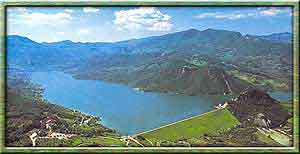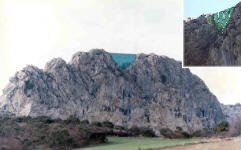Isolati sulle frane
Isolati sulle frane
stanno i vertici
e gli strapiombi
della Morgia,
un tempo lama lucente
nelle estati
di falchi di gridi
di funi di audaci scalate
di sole di vita:
un alberello spettinato
sul pendio
una cicala netta assordante tagliente
nella calura
un canto acuto nel giovane cuore.
Ora silenziosa sta la Morgia
su una terra sempre più vuota
più amara
riscaldata da un sole
che pare divenuto
un tepore lontano.
La gente abbandona le terre vicine,
si spengono i focolari
ad uno ad uno,
i focolari
isolati sulle frane.
Né, come può credersi,
aumentano i falchi
che pure son vita.
Negli inverni interminabili
sta la Morgia
non più tanto pallida di nevi
quanto lacrimosa di rivi
che nelle rughe lunge
le ha dato un lago artificiale.
Là su quel lato
già crescono erbe verdicce
appiccicose e squallide
che arrugginiscono
la cresta di acciaio.
L’umidità vinto ha la neve,
così come nel pensiero degli uomini,
in città gremite isolati
su invisibili frane,
una bava ripugnante
ha sostituito il brivido terso
che dava spesso la legge del cuore.
|
Isolated above the Landslides
Isolated above the landslides
Are the mountain peaks
And the precipices
Of the Morgia[1]
Once a shining blade
In the summers
Of hawks, of shouts
Of ropes, of audacious climbs
Of sun, of life;
A disheveled tree
On the hillside
A cicada[2] sharply deafening,
cutting
In the sultry air
An acute song in its young heart.
Now the Morgia lies silent
Above an ever more empty land
More bitter
Heated by a sun
That seems to have become
A distant warmth.
The people abandon the nearby lands,
The hearths are extinguished
One by one,
The hearths
Isolated above the landslides.
Nor, as it might seem,
Do the hawks increase
Which also are life.
During the interminable winters
The Morgia is there
No longer so pale with snow
As much as tearful with rivulets
That in the lengthy folds
Have formed an artificial lake[3].
There on that side
Yellow-green grasses are already growing
Clinging and desolate
That make the crest of steel[4]
Become rusty.
The snow has beaten the humidity,
In the same way as in men’s thoughts,
In crowded cities isolated
Above invisible disasters (landslides),
A repugnant dribble
Has substituted the clear thrill
That often was given by the law of the heart.
|
|
Translator's Notes:
[1] The Morgia – is a rocky
spur, on a hillside between Gessopalena and Torricella Peligna. It can be
seen from most of the Province of Chieti.
[2] Cicada – a large homopterous* bug with large transparent
wings held roof-like over its back. The males make a loud shrill chirping
sound at night.
* (homoptera have wings of uniform texture)
[3] Lago di Bomba = Lake Bomba is a narrow lake lying in the
middle of the Sangro Valley with a dam at one end; it forms part of the
Sangro River Project.

[4] Reference to the sculpture, a work of Costantinos Varostos.
Costas chose the “Morgia[see 1]” for his dialogue with Nature.
The Morgia has a characteristic “M” shape at its centre, which is known to
have been caused by dynamite, used when the site was part of a local
quarry and was used to create building materials. [Lelio Porreca was an
activist, instrumental in leading protests which were successful in
preventing any further destruction at the Morgia.] At the central cut of
the “M” Costas built a sturdy steel structure that acts as a frame for the
glass strips which unite the two points (of the M). Upon this strong
framework (made by Edil Co-op) he placed a layer of glass strips (given by
SIV of Salvo), fixed with 10 quintals of silicone (given by Bayern). There
is a light within this work that, like a lighthouse, is visible from very
far away.

[See Amici article “Artists’ Campaign” Number 17, December 1996]
English translation courtesy of
Marion Apley Porreca |